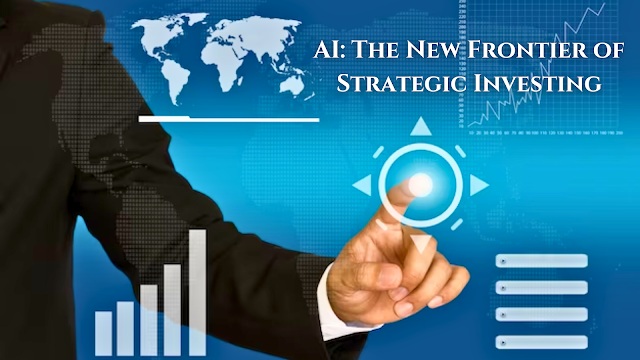The world is fast changing due to artificial intelligence (AI), and investing is no exception.
Artificial intelligence (AI) is being used to automate processes, analyze data, and spot patterns that are challenging for people to notice.
This is significantly affecting how investors decide what to invest in.
Advantages of AI for Strategic Investing
There are several advantages to using AI for strategic investing. First, AI is far faster than humans at analyzing big amounts of data.
As a result, patterns and trends that would be challenging to spot with the unaided eye can be recognized by AI.
Second, AI can be used to develop trading strategies that are based on these patterns and trends. This can assist investors in making better judgments and increasing their returns.
Challenges of AI for Strategic Investing
However, there are also some challenges to using AI for strategic investing. One challenge is that AI requires large amounts of data to train and operate. For smaller investors who do not have access to extensive databases, this can be a barrier to entry.
Another challenge is that AI can be biased. This is because human-generated data, which can be biased, is used to train AI algorithms.
This can lead to AI algorithms making biased decisions.
How AI is Being Used for Strategic Investing
There are a number of ways that AI is being used for strategic investing. One way is to use AI to screen stocks for investment. In order to find stocks that are cheap or overpriced, AI algorithms can be used to examine a company's financial records, news stories, and social media data.
Another way that AI is being used for strategic investing is to analyze market trends. Artificial intelligence (AI) systems can watch previous market data and spot trends that can be used to forecast future market movements.
Finally, AI is also being used to develop trading strategies. AI algorithms can be used to identify trading opportunities and to execute trades automatically.
Companies Leading the Way in AI-Powered Investing
Several businesses are setting the bar for the creation of AI-driven investment products.
One business is BlackRock, the biggest asset manager in the world.
BlackRock has developed an AI-powered tool called Aladdin that is used by institutional investors to analyze risk and make investment decisions. Another company is Kensho Technologies, which provides AI-powered investment research tools to hedge funds and other investors. Finally, Quantopian is a platform that allows users to build and test AI-powered trading strategies.
The Future of AI in Strategic Investing
The future of AI in strategic investing is very promising. As AI technology continues to develop, AI-powered investment tools will become more sophisticated and powerful. Investors will be able to increase their returns and make better judgments as a result.
The constraints posed by AI for strategic investing, such as the need for vast volumes of data and the possibility of bias, must be understood, though.
Conclusion
AI is rapidly transforming the field of investing. The development of sophisticated and potent AI-powered financial tools is significantly altering how investors make decisions.
AI is set to play a bigger role in the future of strategic investing as AI technology advances.
Call to Action
There are a variety of online resources accessible if you want to learn more about AI-powered investment solutions.
Additionally, you can speak with a financial expert who will be able to explain how AI can be applied to enhance your investing strategy.
Q: What is "AI: The New Frontier of Strategic Investing"?
A: The phrase "AI: The New Frontier of Strategic Investing" describes the use of artificial intelligence (AI) technology in the world of finance and investments.
To analyze enormous amounts of data, find trends, and make wise investment decisions, it includes utilizing cutting-edge algorithms and machine learning approaches.
Q: How does AI contribute to strategic investing?
A: AI plays a crucial role in strategic investing by providing sophisticated tools for data analysis, predictive modeling, and risk assessment. It can process significant amounts of financial data in real-time, spot market trends, and produce insights that aid in the decision-making of investors.
AI also enables automation and optimization of investment strategies, leading to improved efficiency and potentially higher returns.
Q: What are the benefits of using AI in strategic investing?
A: There are several benefits of using AI in strategic investing. First off, AI enables investors to make data-driven decisions based on thorough insights because it can process and analyze massive amounts of data considerably faster and more correctly than humans.
Second, AI can spot intricate market connections and patterns that human analysts would miss, resulting in more accurate forecasts and better investing results.
Lastly, AI-powered systems can operate 24/7, continuously monitoring markets and adjusting investment strategies in real time, which can provide a competitive advantage.
Q: Are there any risks or limitations associated with AI in strategic investing?
A: While AI offers significant advantages, there are also risks and limitations to consider. One risk is the potential for algorithmic biases, where AI models may inadvertently incorporate biases present in the training data, leading to biased investment decisions. Reliance on historical data carries another danger because past results aren't always a reliable predictor of future outcomes.
Additionally, AI systems can be vulnerable to cyber threats and hacking attempts, which could compromise sensitive financial information. It's important to carefully monitor and validate AI models to mitigate these risks.
Q: How can investors get started with AI in strategic investing?
A: To get started with AI in strategic investing, investors can consider the following steps:
Educate themselves about AI technologies and their applications in finance and investment.
Identify specific investment goals and strategies that could benefit from AI-driven insights.
Explore available AI tools and platforms designed for investment analysis and decision-making.
Start small by experimenting with AI-powered models or partnering with established financial institutions that offer AI-based investment solutions.
Continuously monitor and evaluate the performance of AI systems, making adjustments as necessary to optimize results.
Q: Can AI completely replace human investors?
A: While AI has the potential to enhance investment decision-making, it is unlikely to completely replace human investors. Human judgment, intuition, and the ability to consider non-quantifiable factors such as market sentiment and geopolitical events remain valuable in the investment process. Instead of replacing human expertise, AI should be viewed as a tool to enhance human capabilities.
Q: Is AI in strategic investing only suitable for large institutional investors?
A: No, AI in strategic investing is not limited to large institutional investors. With advancements in technology, AI tools and platforms have become more accessible to individual investors and smaller firms. A wide spectrum of investors can access AI-driven insights and strategies through a variety of AI-powered investment apps, robo-advisors, and online platforms.
Q: What are some notable success stories of AI in strategic investing?
A: There have been several notable success stories of AI in strategic investing. For example, hedge funds like Renaissance Technologies have achieved significant returns using AI-driven quantitative strategies. Furthermore, it has been shown that AI-powered trading algorithms can beat conventional investment strategies under some market circumstances.
Success examples are not, however, a guarantee of future results, as the effectiveness of AI systems might vary depending on a number of different conditions.
Q: How is AI regulation impacting strategic investing?
A: The regulatory landscape for AI in strategic investing is still evolving. To guarantee that AI systems are utilized properly and do not pose systemic concerns, regulators are increasingly concentrating on topics like algorithmic transparency, fairness, and accountability.
Regulations may impact the development and deployment of AI models in the investment industry, requiring firms to adhere to certain standards and guidelines. It's important for investors and financial institutions to stay informed about relevant regulations and compliance requirements when utilizing AI in strategic investing.




